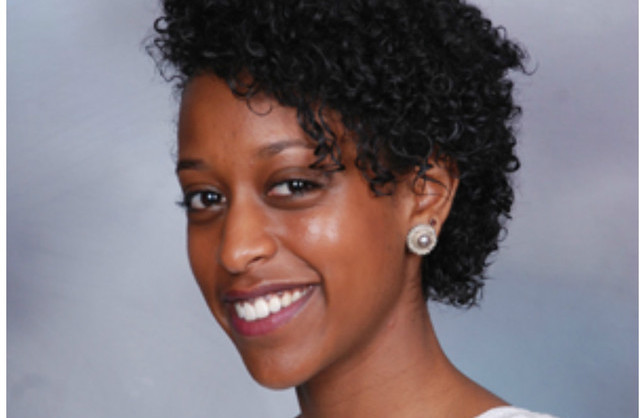 Liyou Libsekal is a recipient of the prestigious Brunel University African Poetry Prize 2014. (Courtesy photo)
Liyou Libsekal is a recipient of the prestigious Brunel University African Poetry Prize 2014. (Courtesy photo)
Tadias Magazine
By Hasabie Kidanu

Published: Monday, December 15th, 2014
New York (TADIAS) – Liyou Libsekal, a 24-year old Ethiopian-born poet is taking great strides in establishing herself as a prominent member of the new generation of African poets. There is no doubt writing is a natural outlet for Ms. Libsekal; her work is decked with traces of her “nomadic life so far and the growth and development that comes with it.” We enter Liyou’s world with Riding Chinese Machines: a dedication to the booming economic and physical transformations of her hometown Addis Ababa – a city swelling with construction, noise, asphalt roads, and congestion.
Riding Chinese Machines
There are beasts in this city
they creak and they crank
and groan from first dawn
when their African-tongued masters wake
to guide them lax and human-handed
through the late rush
when they‘re handled down and un-animated
still as we sleep, towering or bowing
always heavy
we pour cement through the cities
towns, through the wild
onwards, outwards
like fingers of eager hands
stretched across the earth
dug in
With a nostalgic tribute to what-once-was, she narrates her pilgrimage through dislocation, childhood, and tradition. Her techniques often vary – her poems are partly constructed in realms of fantasy and abstraction, and on the other hand, they open sensory valves with images so clear and realized we become full partakers of her stories. Her identity exists as an ongoing project, unconcluded, yet beautifully narrated, as a byproduct of things seen, overheard, spoken, and observed. Her work earned her the prestigious Brunel University African Poetry Prize 2014, an annual poetry award for the development and promotion of African poets.
TADIAS: First and foremost, congratulations on The Brunel University African Poetry Prize. Your poems have incredible sensory engagement, with such rich imagery that we partake in your world fully, and occasionally your work is abstractly delivered. Is that intentional? Are you always in negotiation between those two styles?
Liyou: I wouldn’t say it’s intentional, I’m still finding my voice so I tend to let things flow naturally. When I’m writing something I know how I want it to sound so I go off of that, I’m letting that be my guide, instead of any set intention.
TADIAS: You often write about “home” – its transformations, “poured in concrete” with “beasts” that “groan from first dawn when their African-tongued masters wake”– creating collage of a ever-forward moving city – do you ever get nostalgic about the Addis you and many of us grew up in?
Liyou: A lot of my childhood was spent outside of Ethiopia but Addis was always my family’s home base, so I do have a lot of memories of what the city was like before all this growth. To be honest, as happy as all those memories are, I don’t miss the old landscape because even though the city is somewhat chaotic right now, and everything is changing, it’s a moniker of progress. Living here, you see things change constantly and we’re moving so fast and people’s lives are improving and that’s more important than my memories of a less cluttered or chaotic city.
TADIAS: Any writing rituals?
Liyou: Not really, all I need is quiet and my laptop so I just need to isolate myself so I can write. If I’m having trouble writing I step away and clear my head, usually through meditation, just to find focus and clarity.
TADIAS: Are there things that are too personal to write about?
Liyou: I think everyone has things they many not want to address; I’m working on being as honest as I can with myself. I wouldn’t say there are things I wouldn’t write about because they’re too personal, just because I don’t have to show them to anyone but it’s a process. Being honest with ourselves and putting things on paper can be so powerful but it takes time and courage, it’s a work in progress.
TADIAS: Readers are one thing but family is a different audience – how has your reception been coming from a country where the Arts are somewhat underrepresented?
Liyou: I’ve had a lot of positive responses; it’s been great for the most part. I have talked to people who feel I should write in Amharic but considering my background, that’s not necessarily the best course of action for me; I couldn’t do that justice at the moment.
TADIAS: What/who do you think has had the most contribution to you becoming a great writer?
Liyou: I’ve always had really supportive people around me who value creativity and the arts. It has definitely been helpful to have encouraging people around me, people who are understanding about the fact that I might be off writing for a while and who give me room to do so.
TADIAS: In Hair (published below), a “black child in a white playground” where they “flock to touch a tamed head,” you tackle issues of identity and belonging – growing up, how were you able to negotiate your heritage in a world where you became a cultural ‘outcast’?
Liyou: It is difficult as a child to suddenly not know where you fit in your current world, it can cause a lot of different types of conflict, I touch on that a little bit in the poem. My parents were always very much involved in helping my sister and I understand our culture, we always traveled home when we could so we were never too far from where we came from; but at the same time, they understood our childhood was so different from theirs so they were also learning how to raise us in a new environment. I was very lucky to have parents that always gave me guidance but also let me make my own mistakes because it helped me figure myself out, where I stood and who I was in an otherwise undefined set of circumstances.
Hair
I left Africa carrying my skin
and my father’s thick ringlets
braids were for children,
tussled locks for grown women
eleven and unaware
a black child in a white playground
learns new words
girls flock to touch a tamed head
weaved by loving hands
and chemical cravings set in
It’s your crown says my mother
whose gorgeous mane gets wrapped tight
rolled ready for feverish waves
who convert to straight
what a word
—
About the Author:
Hasabie Kidanu covers arts and literature stories for Tadias Magazine. She is an artist and art historian living in New York City. Born in the United States, Hasabie was raised in Addis Ababa, where she attended Sandford International School. She is a graduate of The University of North Carolina where she studied Art History and French. She currently resides in Brooklyn and works in an art studio and as a freelance writer.
Join the conversation on Twitter and Facebook.

























